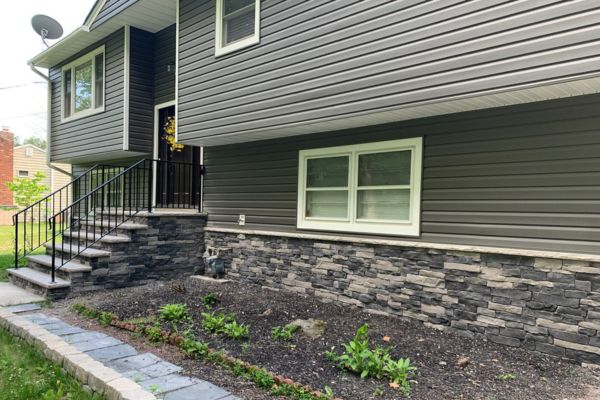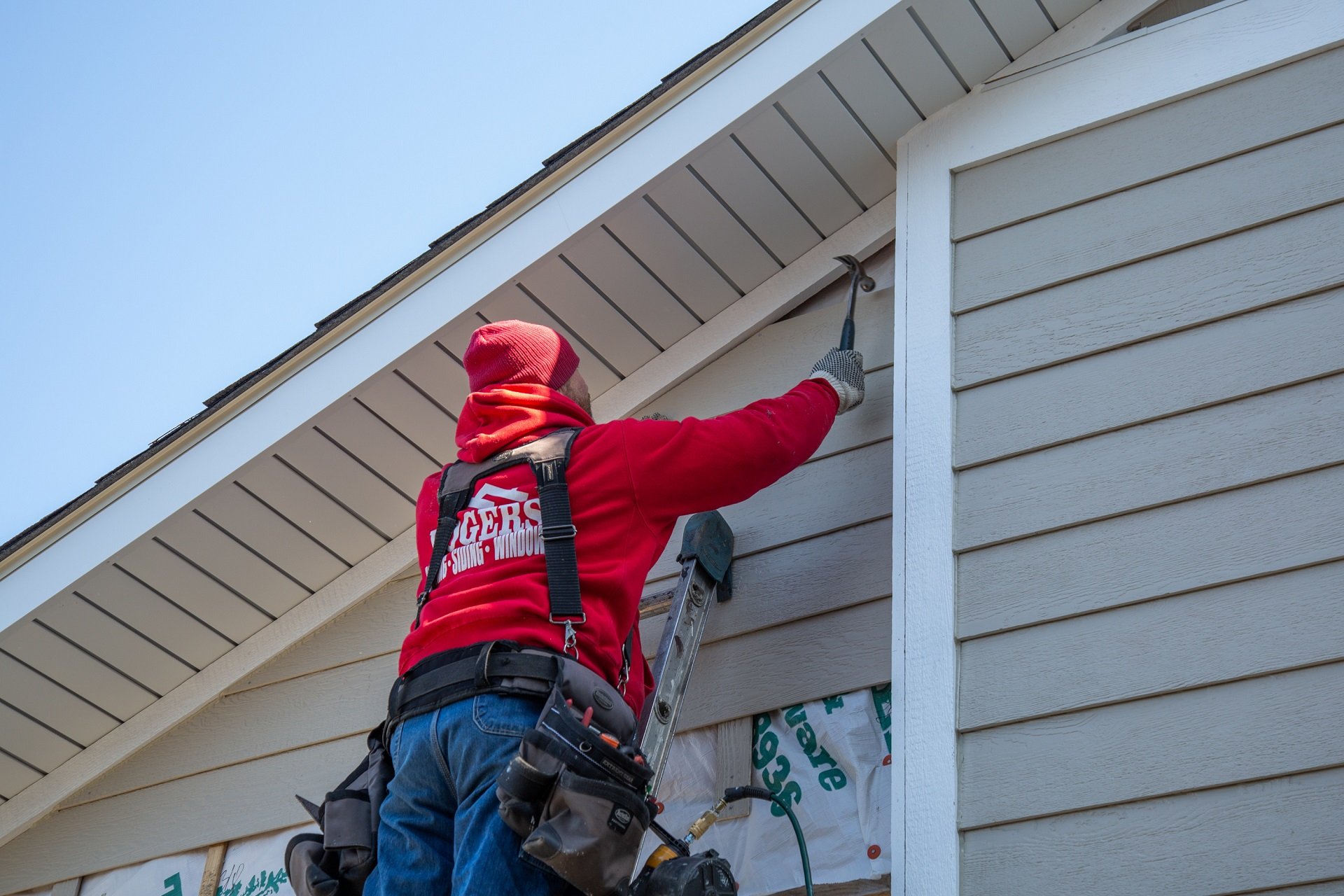Morris Siding Contractor Providing Energy-Efficient Home Exterior Installations
Morris Siding Contractor Providing Energy-Efficient Home Exterior Installations
Blog Article
The Necessary Guide to the Different Sorts Of Exterior Siding and Their Unique Benefits
In the world of home enhancement, picking the appropriate house siding is a critical decision that affects both visual appeal and useful efficiency. With so several options to consider, which exterior siding material truly stands out for your specific task?
Timber Siding
Timber house siding, a preferred option for domestic exteriors, provides an ageless aesthetic that combines all-natural beauty with architectural integrity. This siding product is offered in various styles, consisting of clapboard, roof shingles, and board-and-batten, enabling property owners to tailor their appearance to match their layout choices. Wood siding is typically crafted from sturdy types such as cedar, redwood, or pine, which are understood for their strength and capability to endure ecological stressors.
Among the primary advantages of wood siding is its superb insulation buildings, which can add to energy performance and lower heating prices. Additionally, timber exterior siding is naturally degradable, making it an eco-friendly option when sourced sustainably. Routine upkeep, including paint or discoloration, can extend its life-span and enhance its look, permitting house owners to maintain the all-natural charm of the wood.
Nonetheless, potential disadvantages consist of susceptibility to bugs, rot, and weather condition damages, necessitating appropriate therapy and upkeep - morris siding contractor. Despite these concerns, when properly taken care of, timber siding can offer a attractive and durable service that improves the personality of a home while supplying a cozy, inviting ambience

Vinyl House Siding
Plastic home siding has become a leading option for property owners looking for a low-maintenance exterior alternative that combines durability and affordability. This flexible product is crafted from polyvinyl chloride (PVC), making it resistant to different weather, consisting of dampness and UV rays. Consequently, plastic house siding does not warp, rot, or discolor, making certain resilient visual appeal.
Among the primary advantages of vinyl home siding is its extensive variety of colors and styles, enabling homeowners to accomplish the wanted try to find their property without the requirement for constant repainting. In addition, plastic siding is simple to mount, which can considerably minimize labor prices throughout building or improvement projects.
Vinyl home siding additionally adds to energy performance. Lots of alternatives attribute insulation support, which enhances thermal performance, assisting to maintain comfortable indoor temperatures and potentially reducing power costs. Furthermore, its smooth surface area helps with simple cleaning, needing just regular cleaning with a yard pipe to get rid of dust and particles.
Fiber Concrete House Siding
Fiber concrete house siding has actually gotten grip among house owners and builders alike as a result of its impressive mix of resilience and visual flexibility. Composed of a mix of sand, cement, and cellulose fibers, this house siding choice is engineered to withstand severe weather, consisting of high winds, hefty rain, and temperature variations, making it a resilient choice for residential exteriors.

Among the key benefits of fiber concrete home siding is its resistance to insects, such as termites, and its non-combustible nature, offering enhanced useful site fire safety. morris siding contractor. Furthermore, it is available in a large array of shades, designs, and structures, allowing home owners to achieve their wanted visual without sacrificing performance
An additional benefit is its low upkeep demands; fiber concrete exterior siding commonly requires painting or discoloration every 5-10 years, which is much less frequent than other products. Furthermore, its longevity contributes to a reduced total price of ownership, as it lowers the need for regular repair services or substitutes.
Inevitably, fiber concrete house siding stands for an excellent investment for those seeking a resilient, appealing, and versatile outside alternative, incorporating both kind and feature to boost the home's aesthetic allure.
Steel Exterior Siding
The appeal of metal exterior siding hinges on its robust sturdiness and contemporary aesthetic charm, making it a preferred choice for contemporary architecture. Available in products such as aluminum and steel, metal exterior siding uses a variety of shades and coatings, allowing homeowners to attain a personalized appearance that enhances their style vision.

Power performance is an additional significant benefit, as many metal siding items are designed with insulation click this options that help regulate indoor temperatures. This can lead to reduced power expenses in time. Additionally, metal exterior siding is typically recyclable, making it an ecologically friendly option for sustainability-minded home owners.
The installment procedure for steel exterior siding can be fairly straightforward, resulting in a quicker turn-around time for building projects. Overall, steel house siding integrates performance and style, making it a sensible alternative for those seeking a aesthetically attractive and enduring outside surface.
Brick and Rock Exterior Siding
Brick and stone exterior siding stands apart as a timeless choice that boosts the visual appeal of any home. Known for their durability and low maintenance, these products offer an exceptional return on investment while raising the building's visual appeal. Readily available in different shades, structures, and patterns, block and rock can be customized to suit varied building styles, from typical to contemporary.
One of the primary advantages of block and stone home siding is their power performance. Both materials have natural protecting homes that aid manage indoor temperatures, potentially lowering cooling and heating expenses. In addition, they offer exceptional fire resistance compared to various other exterior siding choices, adding to boosted safety.
One more benefit is their durability. Block and rock can last for decades, commonly calling for minimal upkeep beyond periodic cleansing. Unlike timber house siding, they are impervious to parasites and rot, ensuring a lasting exterior that endures the aspects.
Final Thought
In recap, the choice of siding dramatically affects a home's aesthetic appeal, energy performance, and maintenance needs. Each type of siding-- whether timber, vinyl, fiber cement, block, or steel and stone-- supplies special benefits customized to my website various home owner preferences and ecological conditions.
One of the key benefits of timber siding is its superb insulation residential properties, which can contribute to energy performance and reduced heating prices. Additionally, wood house siding is biodegradable, making it an eco pleasant choice when sourced sustainably.One of the main advantages of metal home siding is its resistance to numerous environmental elements.Power effectiveness is one more significant advantage, as lots of steel exterior siding products are created with insulation alternatives that help control indoor temperature levels. Each kind of siding-- whether wood, vinyl, fiber brick, cement, or metal and stone-- uses one-of-a-kind benefits tailored to various property owner preferences and environmental conditions.
Report this page